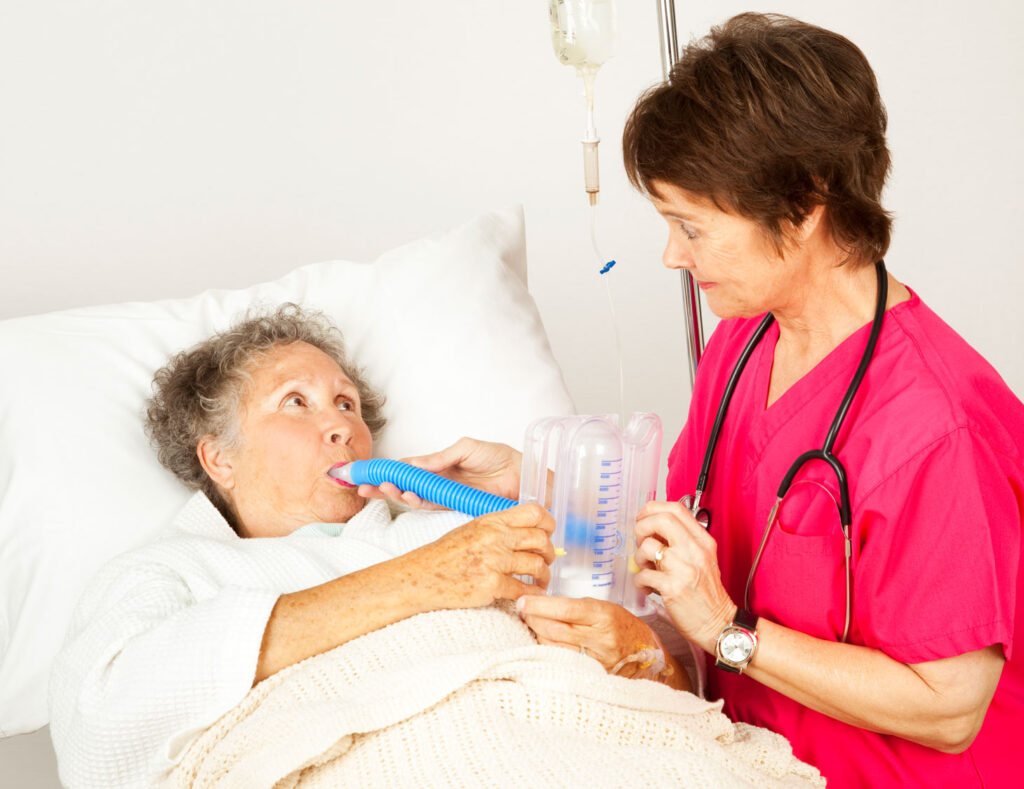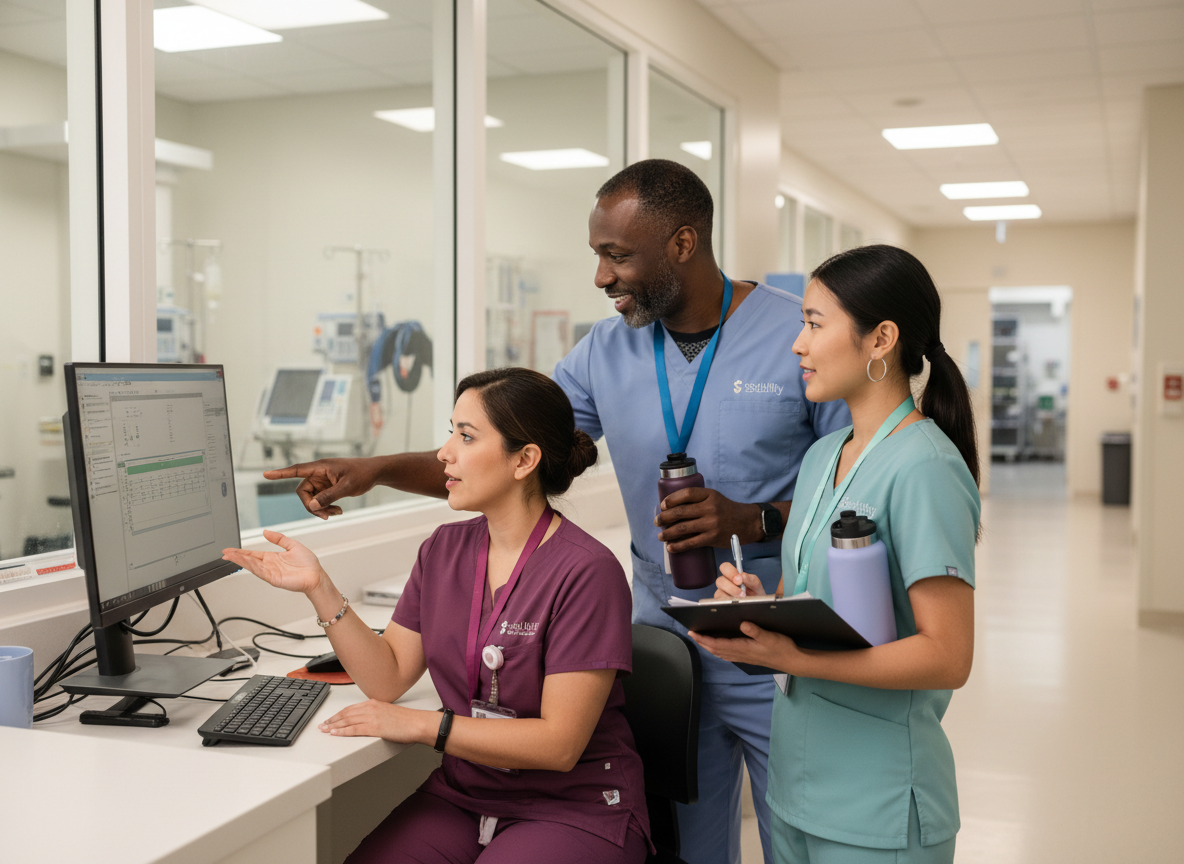If you’re considering a career as a traveling allied healthcare professional, it’s important to understand the licensing process and the requirements involved. The team at Stability Healthcare is committed to helping you navigate this process smoothly to find the best travel assignments without worrying too much about the licensing process.
We’re here to provide you with basic information about the licensure process or relevant certifications required to work as a traveling allied healthcare professional. If you decide to look for an allied health travel assignment with Stability Healthcare, our team will help you navigate the licensing process and empower the next generation of clinicians and nurses who are crucial to our country’s healthcare industry.
What is an Allied Health Professional?
Allied healthcare professionals is an umbrella term for individuals who work in the healthcare field but are not involved in medicine or nursing, at least not directly. Their career paths have led them to provide critical support for those on the frontlines of a patient’s healthcare and sometimes even deal with a patient themselves. All healthcare facilities value allied health workers as much as their nursing workers.
There are many different professions that fall under the category of allied health, but the most common ones include:
- Audiologists and Speech Therapists.
- Therapists who specialize in the treatment of occupational disorders.
- Healthcare professionals who specialize in physical therapy.
- Practitioners of respiratory therapy.
- Dieticians.
- Diagnostic medical sonographers and radiographers.
- Experts in the field of medical technology.
Allied health travelers are, therefore, those who are looking to fill these allied travel positions in healthcare facilities outside of the home city or state, depending on staffing agencies like Stability Healthcare to improve their chances of finding quality allied health jobs in worthwhile locations and with appropriate benefits.
Overview of The Allied Health License Process
To work as a traveling allied healthcare professional, you will need to possess the necessary certifications and licenses for your specific field. Any healthcare organization or facility needs assurances that you can do the work required for a patient’s health, so there’s a need for valid proof of your training and education.
That proof could vary by state and hospital. However, there are some states that share standardized licensing requirements, called the compact nursing license, which are easier to comply with for traveling allied health professionals.
Stability Healthcare is here to guide you on this process and offer opportunities for various allied health professionals, including physical therapists, respiratory therapists, occupational therapists, imaging technologists, and more.
General Prerequisites Before Obtaining an Allied Health License
While the licenses and certifications may vary by state, there are basic requirements any allied travel healthcare professionals can’t do without. We at Stability Healthcare are a professional staffing agency for travel allied health workers and are here to point you in the right direction, starting with some of the very basic requirements of anyone interested in an allied health career.
Professional and Clinical Experience
Employers often prefer allied health travel workers who have completed industry-standard training or obtained professional certifications in areas such as Basic Life Support and Advanced Cardiac Life Support, specifically in the form of the American College of Emergency Nurses Basic Life Support (BLS) or Advanced Cardiac Life Support (PALS), or Advanced Women’s Health Nursing (AWHONN) certifications. Not all nursing or allied health travel specializations need certifications, but having as many relevant credentialing requirements as possible will make you more competitive, with some acute care and clinical experience in either a healthcare or hospital setting of at least one or three years being necessary.
Examination Requirements
Before starting a job in travel allied health, you will also need to undergo a drug test and background check and provide proof of vaccinations. To simplify the process of finding travel jobs in the healthcare field, it is beneficial to work with a staffing agency like Stability Healthcare that specializes in this industry.
With their expertise and guidance, you can navigate the competitive job market more effectively and find exciting travel assignments that suit your career goals.
The Enhanced Nursing Licensure Compact (eNLC)
The Enhanced Nursing Licensure Compact (eNLC) is an agreement between 41 states in the United States that allows nurses to have a single multistate license, enabling them to practice in any of the participating states. This compact nursing license has inspired states to also create similar compact licenses for allied health employees in the healthcare industry, as it eliminates the need for them to obtain multiple licenses when working in different states.
With the eNLC, travel nurses or allied health workers with a nursing compact license can easily move between states and find positions in several hospitals or healthcare organizations without the hassle of going through the lengthy and expensive process of obtaining individual state licenses.
Occupation therapists can benefit from the OTCC compact license process, for example, while the ASLP-IC is meant for audiologist and speech-language pathologist compact licenses. Physical therapists have set up the PT Compact as well.
These compacts and the enhanced compact nursing license have helped to streamline the hiring process for healthcare organizations. With the compacts in place, hospitals and healthcare facilities can quickly and efficiently hire travel allied health workers who hold a multistate license. This not only saves time but also reduces administrative burdens for both healthcare organizations and the workers themselves. The compact nursing license creates a more flexible and accessible job market for travel allied health workers, allowing them to have a wider range of job opportunities and increasing their chances of finding employment in states that are part of the compact.
Overall, the Enhanced Nursing Licensure Compact has revolutionized the healthcare industry for travel-allied healthcare workers. It has simplified the licensing process, increased job opportunities, and made it easier for healthcare organizations to hire these workers. Stability Healthcare has years of experience helping both travel nurses with the compact nursing license process and allied workers with their compact licenses.

Types of Allied Health Licenses
Whether through the multiple compact licenses available or for individual states, all allied health professionals require some basic experience and certifications to get started on the path of an allied traveler career.
Here, we provide a summary of the jobs and their certifications that are essential to the licensing process in the allied health field.
Respiratory Therapist License
Patients who struggle with breathing often need the help of respiratory therapists. Chronic respiratory disorders like emphysema and asthma are two common examples of conditions that fall into this category.
- Registered Respiratory Therapist (RRT) Certification: This certification is commonly required for travel respiratory therapists. To obtain the RRT certification, individuals must first complete an accredited respiratory therapy program and pass the National Board for Respiratory Care (NBRC) exams. This certification demonstrates a high level of expertise and ensures that the therapist has met the national standards for respiratory therapy practice.
- State License: In addition to the RRT certification, travel respiratory therapists must also obtain a license to practice in the state(s) where they will be working. The specific licensure requirements vary from state to state but typically include completing an application, submitting proof of education and certification, passing a state-specific exam, or providing proof of the RRT certification. This license ensures that the therapist is legally allowed to provide respiratory care services in that state.
IR Tech License
Also known as IR Technicians or IR Techs, these professionals assist physicians and interventional radiologists in performing procedures that involve scanning patients’ organs and bodies. These scans are crucial for diagnosing and treating a wide range of illnesses.
- Registered Technologist (RT) certification in Radiography. This certification is offered by the American Registry of Radiologic Technologists (ARRT) and is widely recognized and required by many employers and states.
Mammography Tech License
Mammography technologists are radiology technologists who specialize in mammography. Their main role is to use low-dose x-ray equipment to capture diagnostic images of the breast. In their work, they often work closely with physicians and other medical professionals to ensure proper patient care. They typically report to a manager or chief technologist. If you’re interested in mammography technician allied health travel jobs, you can find them at Stability Healthcare.
- The American Registry of Radiologic Technologists (ARRT) certification in Mammography. This certification demonstrates that the tech has met the educational and clinical requirements necessary to perform mammography examinations. It typically involves passing an exam administered by the ARRT and maintaining continuing education credits to stay updated on the latest advancements in the field. This certification is widely recognized and accepted by most states as a requirement for practicing as a mammography tech.
Travel Radiology Tech Licenses
A radiologic technician plays a crucial role in helping medical professionals diagnose illnesses and injuries using diagnostic imaging technology such as x-ray, CT, MRI, and mammography devices.
- The American Registry of Radiologic Technologists (ARRT) certification. This certification is widely recognized and required by many healthcare facilities and state regulatory bodies. The ARRT certification ensures that radiology techs have met certain educational and ethical standards and have demonstrated competency in their field. It is important for travel radiology techs to hold this certification as it helps establish their credibility and demonstrates their ability to perform radiologic procedures safely and effectively.
Ultrasound Tech Licenses
Ultrasound technologists, who are also referred to as diagnostic medical sonographers, have a crucial role in the diagnosis and treatment of patients. These professionals use imaging equipment that produces high-frequency waves to capture images or conduct tests on different parts of the body. If you are interested in Ultrasound Tech allied health travel jobs, Stability Healthcare offers opportunities in this field.
- The Registered Diagnostic Medical Sonographer (RDMS) certification. This certification is offered by the American Registry for Diagnostic Medical Sonography (ARDMS) and is widely recognized in the field of ultrasound technology. It demonstrates that the individual has met the educational and clinical requirements and has passed the appropriate examinations to perform ultrasound procedures safely and accurately. Having RDMS certification allows travel ultrasound techs to work in various healthcare settings across different states in the U.S.
X-Ray Tech or Rad Tech License
The main role of a radiology technician is to operate and perform imaging exams, such as X-rays, CT scans, and MRIs. These technicians are responsible for producing high-quality images, as they are crucial in detecting possible health issues.
- The American Registry of Radiologic Technologists (ARRT) certification. This certification is widely recognized and required by many employers and state regulatory bodies. It demonstrates that the individual has met the necessary education and competency requirements to safely operate x-ray equipment and perform radiographic procedures.
Registered Polysomnographic Technologist (RPSGT)
A Registered Polysomnographic Technologist (RPSGT) is a healthcare professional who specializes in conducting sleep studies and managing sleep disorders. They are responsible for performing and analyzing polysomnograms, which are tests that record physical activity while you sleep. These professionals play a crucial role in diagnosing and treating sleep disorders such as sleep apnea, insomnia, narcolepsy, and restless leg syndrome. The RPSGT certification is a globally recognized credential in the healthcare industry, demonstrating a high level of competence and commitment to the field of sleep medicine.
The RPSGT certification is offered by the Board of Registered Polysomnographic Technologists (BRPT) and is accredited by the National Commission of Certifying Agencies (NCCA). To become an RPSGT, candidates must meet specific eligibility requirements, which include a certain amount of clinical experience or education in the field, holding a current CPR or Basic Life Support certification, and agreeing to adhere to the BRPT Standards of Conduct. The certification process involves passing an exam, which ensures that the candidate has the necessary knowledge and skills to provide high-quality care to patients with sleep disorders.
Occupational Therapist License
Occupational therapists utilize therapeutic strategies to assist patients in enhancing, rehabilitating, or maintaining their ability to perform everyday tasks.
- The Occupational Therapist Registered (OTR) credential. This certification is granted by the National Board for Certification in Occupational Therapy (NBCOT). It ensures that the individual has met the required standards and competencies to practice as an occupational therapist. It is typically required by state licensing boards to legally practice occupational therapy in the United States.
Physical Therapist License
A physical therapist is a healthcare professional who specializes in treating patients with physical injuries and chronic health conditions. Their main goal is to help patients manage pain, improve their range of motion, and enhance their overall quality of life. If you’re looking for physical therapist allied health travel jobs, you can find them at Stability Healthcare.
- The Physical Therapist (PT) license. This license is granted by each state’s respective licensing board and ensures that the individual has met the necessary requirements to practice physical therapy. The PT license typically requires the completion of an accredited physical therapy program, passing the National Physical Therapy Examination (NPTE), and meeting any additional state-specific requirements. This license is essential for travel physical therapists as it allows them to legally practice and provide therapy services in different states across the country.
Speech Language Pathologist Jobs Sterile Processing Technician License
Speech-language pathologists (SLPs) are healthcare professionals who specialize in treating speech and swallowing problems. Their first step is to identify and evaluate the issues before developing treatment plans to address them. SLPs work with patients of all ages, from children to older adults, and treat a wide range of disorders.
- The Certificate of Clinical Competence in Speech-Language Pathology (CCC-SLP) issued by the American Speech-Language-Hearing Association (ASHA). This certification demonstrates that the individual has met the necessary educational and professional requirements to practice as a speech-language pathologist. It is widely recognized and accepted by state licensing boards across the United States.
Cath Lab Tech License
Cath Lab Technicians, also known as cardiac catheterization technologists, play a crucial role in the cardiology care team. They assist physicians in performing diagnostic imaging and support them during minimally invasive surgery on patients’ cardiovascular systems.
- The Registered Cardiovascular Invasive Specialist (RCIS) certification. This certification is offered by the Cardiovascular Credentialing International (CCI) and is widely recognized and accepted in the field of invasive cardiology. To obtain the RCIS certification, individuals must meet specific educational requirements, complete a certain number of clinical hours, and pass a comprehensive examination.
Clinical Lab License (CLS)
Clinical Lab Scientists, also known as medical laboratory scientists (MLS), play a crucial role in analyzing various biological samples provided by the lab and healthcare team. They are responsible for reporting the results of their scientific testing to physicians, making them an essential component of a patient’s diagnostic and treatment journey. If you’re seeking allied health travel jobs in Clinical Lab Science, Stability Healthcare offers opportunities in this field.
- The Medical Laboratory Scientist (MLS) certification. This certification is offered by the American Society for Clinical Pathology (ASCP) and is widely recognized and accepted across the country. To obtain the MLS certification, individuals must have a bachelor’s degree in medical laboratory science or a related field, complete a clinical internship, and pass the ASCP Board of Certification examination.
CT Tech License
Computed Tomography Technicians, or CT Techs, play a crucial role in healthcare teams. They use computerized tomography machines to capture diagnostic images of patients’ internal systems. These scans are essential for detecting life-threatening diseases and conditions, such as cancer and osteoporosis.
- The American Registry of Radiologic Technologists (ARRT) certification in Computed Tomography (CT). This certification is recognized nationwide and demonstrates the individual’s competence in performing CT procedures. It typically requires candidates to complete an approved educational program in radiologic technology and pass an examination.
Dialysis Technician License
Dialysis technicians are vital in the care of patients with end-stage renal diseases and kidney failures. They are also referred to as hemodialysis technicians and are responsible for administering dialysis treatment to these patients. In addition to this important role, they also have other responsibilities within healthcare settings. Dialysis techs work alongside other healthcare providers and operate in a fast-paced environment on a daily basis. If you are interested in pursuing a career as a Dialysis Technician, you can find allied health travel jobs in this field at Stability Healthcare.
- The Certified Hemodialysis Technician (CHT) certification. This certification is offered by the Nephrology Nursing Certification Commission (NNCC) and is recognized by most states as a requirement for dialysis technicians. To obtain this certification, individuals must typically complete an approved training program, pass a written examination, and meet certain experience requirements. The CHT certification ensures that dialysis technicians have the necessary knowledge and skills to provide safe and effective care to patients undergoing hemodialysis treatment.
- The Board of Nephrology Examiners Nursing and Technology (BONENT) offers dialysis technician licenses.
Echocardiogram Technician License
Echo technicians, also known as echo techs, are ultrasound technicians who specialize in using echocardiography machines to obtain images of patients’ hearts. They collaborate with other healthcare professionals to diagnose and treat heart conditions by collecting information and generating images.
- The Registered Diagnostic Cardiac Sonographer (RDCS) certification. This certification is offered by the American Registry for Diagnostic Medical Sonography (ARDMS). To obtain this certification, individuals must have a minimum of a high school diploma or equivalent, complete a recognized cardiac sonography program, and pass the RDCS examination.
EGG Technician License
An electroencephalographic (EEG) technician or technologist is a medical specialist who uses specialized equipment to measure brain abnormalities and track nervous system activity. If you’re interested in EEG Technician allied health travel jobs, you can find them at Stability Healthcare.
- The Registered Electroencephalographic Technologist (R.EEG.T) certification. This certification is offered by the American Board of Registration of Electroencephalographic and Evoked Potential Technologists (ABRET). To obtain this certification, technicians must meet a set of eligibility requirements, including completing an accredited EEG program or having equivalent work experience and passing a comprehensive examination.
Histology Tech License
A Histology Technician plays a crucial role in a pathology laboratory team. They are responsible for handling, receiving, processing, and preparing tissue samples for examination by the lab’s pathologist. The histology tech also coordinates tasks and activities within the lab to ensure accurate diagnoses of patient illnesses.
- The HT (ASCP) certification. The HT (ASCP) certification is offered by the American Society for Clinical Pathology (ASCP) and is recognized as a standard credential for histology technicians. To obtain this certification, individuals typically need to complete an accredited histotechnology program, gain relevant work experience, and pass an examination administered by the ASCP.
Med Tech License
Med Techs, also known as medical technicians or medical technologists, play a crucial role in laboratories and hospitals. They are responsible for ensuring the accurate collection, testing, and analysis of medical samples. This includes handling and examining tissue, blood, as well as bodily fluids such as urine, saliva, and sweat.
- The Certified Medical Laboratory Technician (MLT) certification. This certification is offered by the American Society for Clinical Pathology (ASCP) and is widely recognized and accepted in the field. It ensures that the technician has the necessary knowledge and skills to perform laboratory tests and procedures accurately and efficiently. Obtaining this certification typically requires completing an accredited MLT program and passing a nationally recognized exam.
Medical Lab Technician
Medical Laboratory Technicians (MLTs) play a vital role in the functioning of healthcare organizations. They are responsible for collecting samples and performing tests, both routine and emergency, that are requested by physicians. MLTs’ contributions are invaluable as they play a crucial role in the accurate diagnosis and treatment of patients.
- The Medical Laboratory Technician (MLT) certification. This certification is offered by the American Society for Clinical Pathology (ASCP) and is widely recognized and accepted by most states. In order to obtain this certification, individuals must complete an accredited MLT program and pass the MLT certification exam.
MRI Tech Jobs
Magnetic Resonance Imaging Technologists, also known as MRI Techs, play a vital role in the healthcare process. They support physicians and other healthcare professionals by operating and maintaining imaging machinery. This allows doctors to focus on treating patients and providing the best possible healthcare. If you are interested in MRI Tech’s allied health travel jobs, you can find them at Stability Healthcare.
- The American Registry of Radiologic Technologists (ARRT) certification in Magnetic Resonance Imaging (MRI). This certification is widely recognized and required by many states for MRI technologists to practice legally and operate imaging machinery. To obtain this certification, individuals must complete an accredited MRI technologist program, meet the clinical experience requirements, and pass the ARRT examination in MRI.
OR Technician Jobs
Operating room technicians play a crucial role in the surgical team by ensuring the safety of the operating theater. They are responsible for checking the functionality of equipment and technologies used by surgeons during procedures.
- The Certified Surgical Technologist (CST) certification. This certification is awarded by the National Board of Surgical Technology and Surgical Assisting (NBSTSA). It demonstrates that the individual has met the necessary knowledge and skills required to work as a surgical technologist. The CST certification typically requires the completion of an accredited surgical technology program and passing a national exam. It is a widely recognized certification in the field and is often required or preferred by employers.
In addition to the allied health professions mentioned above, there are still many other kinds of positions included in allied health such as medical assistant, physician assistant, athletic trainer, medical imaging, dental hygienist, nuclear medicine technologist, pharmacy technician, cardiovascular technologist, and more.

Benefits of Obtaining an Allied Health Travel Job with a License
Obtaining certifications and a license for an allied health travel job can provide numerous benefits.
Gives You Credibility and Allied Health Providers Peace of Mind
Certifications and licenses provide a sense of credibility and trustworthiness to clients and patients. When working in the allied health field, individuals rely on healthcare professionals to provide safe and effective care. Having the appropriate certifications and licenses demonstrates that you have met the necessary standards and regulations, giving peace of mind to those who seek your services.
Increased Career Options and Job Availability
Certifications and a license demonstrate a high level of competency and expertise in a specific field. Having these credentials can enhance your professional reputation and increase your chances of securing job opportunities. Employers often value certifications as they assure them of your knowledge and skills, making you a more desirable candidate.
Higher Paying Salary Opportunities
Being certified can open doors to higher-paying positions. Many allied health travel jobs require specific certifications or licenses as a prerequisite. By obtaining these credentials, you can qualify for higher-level positions that offer better salaries and benefits. Certifications may also lead to career advancement opportunities, as they showcase your commitment to professional development and continuous learning.
Obtaining certifications and a license for an allied health travel job can significantly benefit your career.
They enhance your professional reputation, open doors to higher-paying positions, and provide a sense of credibility to clients and patients. Investing in certifications and licenses can be a valuable step towards advancing your career and ensuring your success in the allied health field.
The Application Process for an Allied Health Travel Job With a License
We know applying for a license can seem stressful, but it doesn’t have to be! At Stability Healthcare, your licensing specialist will be with you every step of the way. No matter where you want to work, we’ll provide the support you need to get you where you want to go.
Whether you are looking to work in a specific state or multiple states, we have the expertise to assist you. Our team will provide you with all the necessary information, documents, and support required to ensure a successful license application. We will work closely with you to understand your goals and help you navigate the licensing requirements specific to your desired location.
At Stability Healthcare, we believe in providing comprehensive support to our healthcare professionals.
With our support, you can focus on your career while we handle the licensing process. We are committed to helping you achieve your professional goals and making this a seamless and rewarding experience for both you and us.
Contact us today to get started on your licensing journey. We are excited to assist you in reaching your desired destination.




